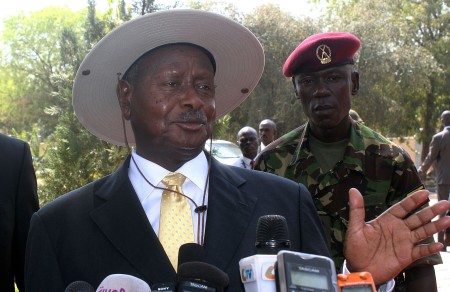Ugandan President Yoweri Museveni has asked the country’s security agencies to train Ugandans to fight Somalia’s Al-Shabaab group.

“I have, actually, already given confidential instructions to the armed forces, including the police, the Uganda People’s Defence Forces and the internal security organization, among others, to reactivate the military training of Ugandans, starting from senior-six secondary level, as guided by intelligence,” he wrote in a four-page letter mailed to journalists by his press secretary.
Museveni, whose country’s army is currently deployed in Somalia fighting Al-Shabaab, dismissed recent Al-Shabaab attacks against civilians in Uganda and Kenya –the latter of which also has troops deployed in Somalia – as “criminal, cowardly and monstrous.”
“We can harden the soft targets with the concept of the armed population, maybe, initially, in the threatened areas as defined by intelligence,” he said.
In the 1980s and 1990s, Uganda trained a militia comprised of nearly two million men and women. However, with increased secondary school and university enrolment, the numbers became too big.
Museveni said this had forced Uganda to “suspended that generalised mass training and, instead, concentrated on the areas that had insecurity at that time.”
Al-Shabaab claimed responsibility for the 2010 terrorist bombings that killed over 70 people in Kampala.
The Ugandan leader, for his part, believes Al-Shabaab is “already defeated.”
“The brutality they exhibit may scare people, but it is defeatable and it is the last desperate card,” he insisted.
“They can no longer move in big groups – platoon size – 30 to 40 or more because they will be detected and destroyed by the army,” Museveni said.
He added that the fighters were now moving in small groups of four or five to conceal their numbers.
“The one factor we must emphasise is intelligence – tactical in a locality and strategic in the whole country and the region,” said the Ugandan leader.









